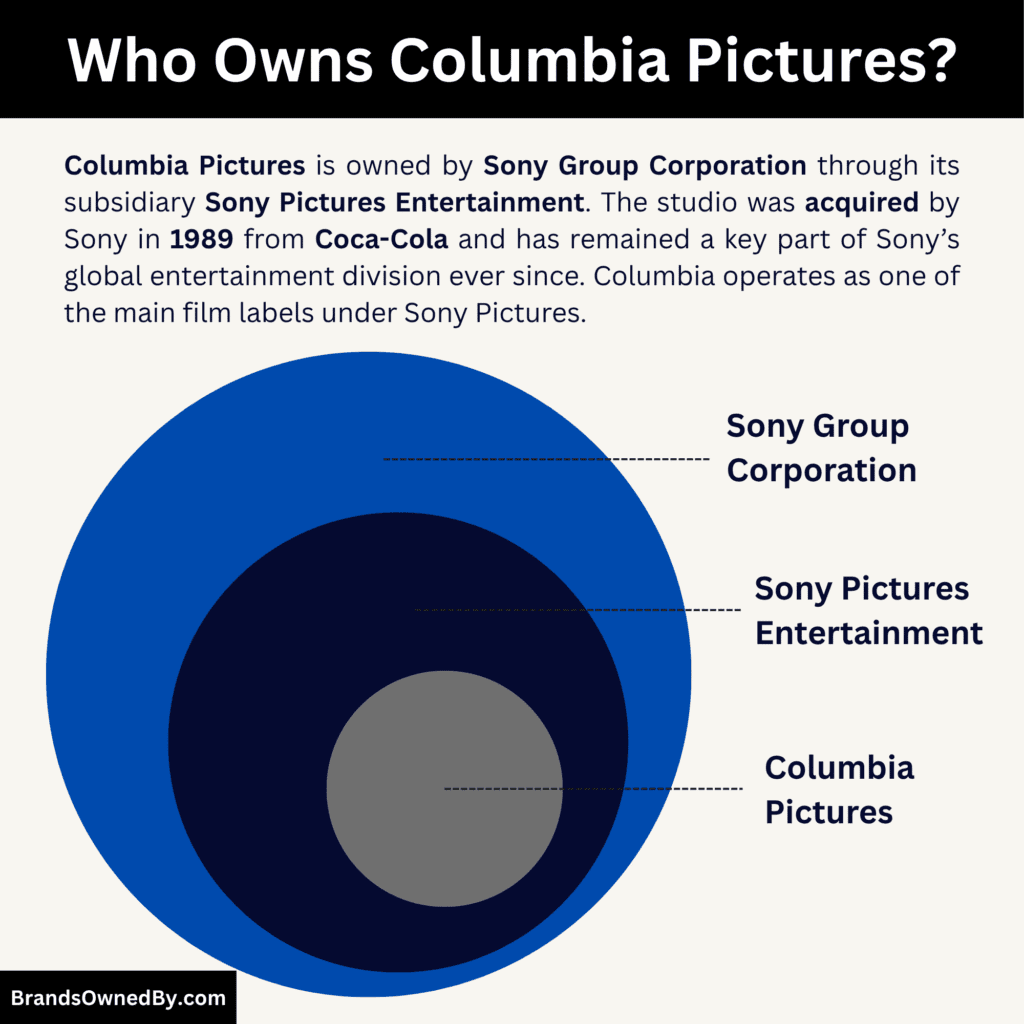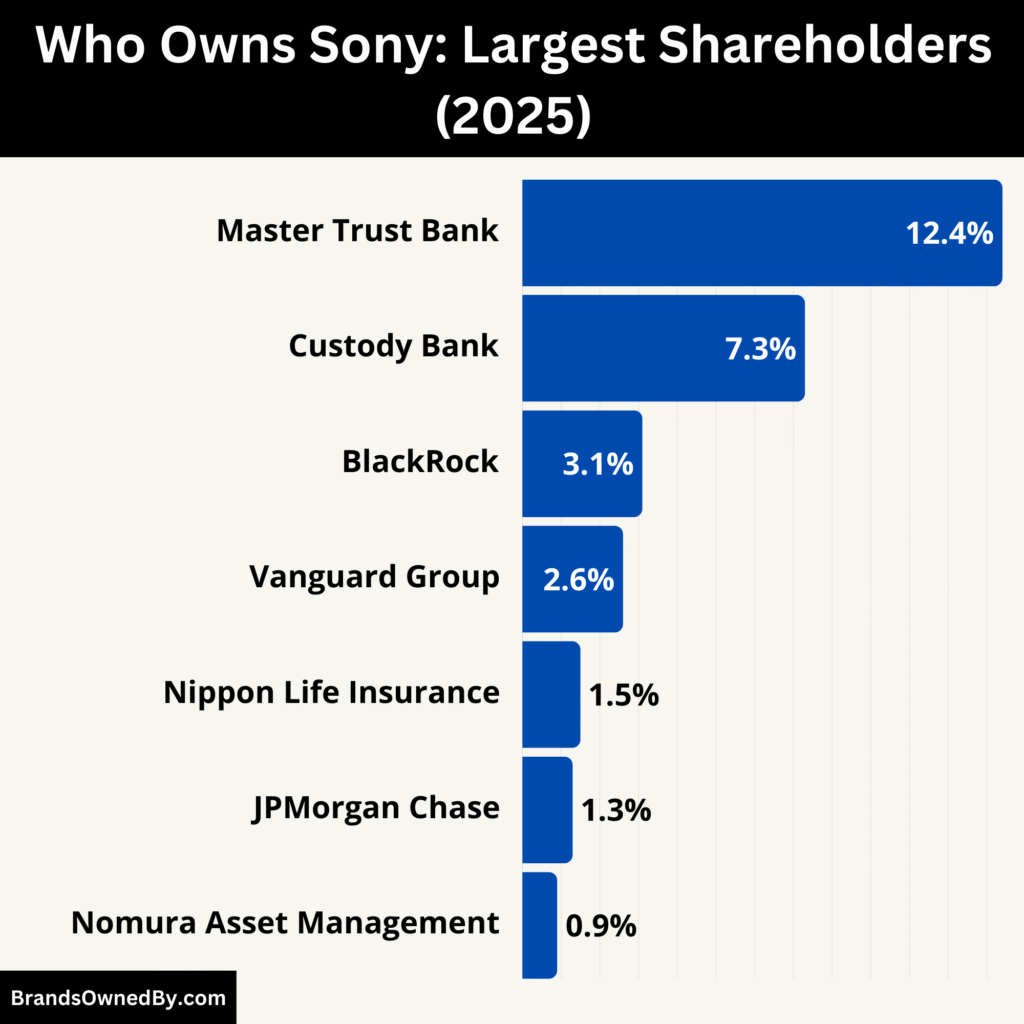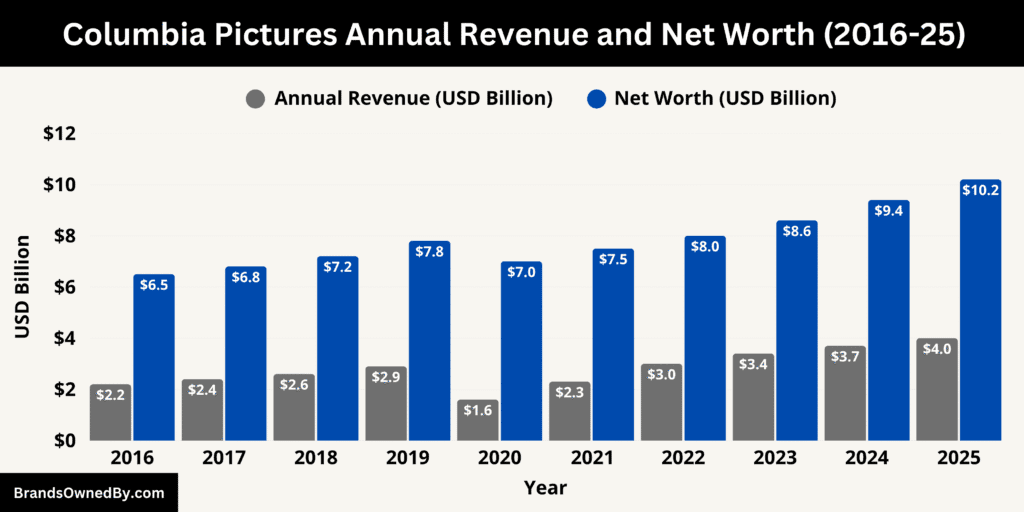Columbia Pictures is one of the most recognizable names in Hollywood, known for producing some of the most iconic films in cinema history. If you’re wondering who owns Columbia Pictures today, the answer traces back to one of the largest entertainment giants in the world. This article explores the history, ownership structure, leadership, financials, and affiliated companies of Columbia Pictures in detail.
Columbia Pictures Company Profile
Columbia Pictures is a major American film production and distribution studio headquartered in Culver City, California. It operates as one of the core film labels under Sony Pictures Entertainment, which is a subsidiary of Sony Group Corporation, based in Tokyo, Japan.
In 2025, Columbia Pictures remains one of the most iconic and active film studios in Hollywood, producing box office successes, franchise films, and original content for both theatrical and streaming platforms. It is closely associated with high-profile franchises such as Spider-Man, Bad Boys, Jumanji, Ghostbusters, and Venom.
Founding and Founders
Columbia Pictures was founded in 1918 under the original name CBC Film Sales Corporation. The founders were:
- Harry Cohn
- Jack Cohn
- Joe Brandt.
The company was renamed Columbia Pictures in 1924 to boost its public image and brand credibility. Harry Cohn emerged as the central figure in the studio’s rise, serving as president and guiding the company through its early decades.
Key Milestones in Columbia Pictures History
- 1924: Renamed to Columbia Pictures, signaling its intent to compete with larger Hollywood studios.
- 1930s–1940s: Gained acclaim through films directed by Frank Capra, including It Happened One Night (1934), which won five Academy Awards.
- 1948: Became one of the “Big Eight” studios during Hollywood’s Golden Age.
- 1982: Acquired by The Coca-Cola Company, marking a shift toward corporate ownership.
- 1987: Coca-Cola spun off Columbia into a separate entity, Columbia Pictures Entertainment.
- 1989: Sony Corporation acquired Columbia Pictures Entertainment for $3.4 billion, making it one of the biggest acquisitions of a U.S. media company by a Japanese firm.
- 1990s–2000s: Launched major franchises like Men in Black, Spider-Man, and The Da Vinci Code under Sony’s ownership.
- 2019: Released Spider-Man: Far From Home, which grossed over $1.1 billion globally.
- 2021: Adapted to pandemic challenges by pushing digital-first and hybrid theatrical releases.
- 2023–2025: Returned to strong box office performance with new films in the Ghostbusters, Bad Boys, and Spider-Verse franchises, contributing heavily to Sony’s global media growth.
Who Owns Columbia Pictures?

Columbia Pictures is fully owned by Sony Pictures Entertainment, which is the television and motion picture production and distribution arm of Sony Group Corporation. Sony Pictures operates several film labels, and Columbia is one of its flagship studios, alongside TriStar Pictures, Screen Gems, and Sony Pictures Animation.
Sony Pictures Entertainment is headquartered in Culver City, California, and oversees all operations of Columbia Pictures, including financing, production, global distribution, and licensing.
Ultimate Owner: Sony Group Corporation

The ultimate parent of Columbia Pictures is Sony Group Corporation, a Japanese multinational conglomerate based in Tokyo. Sony is involved in various industries including electronics, gaming (PlayStation), music, financial services, and entertainment.
As of 2025, Sony Group Corporation owns 100% of Sony Pictures Entertainment, and by extension, fully controls Columbia Pictures. It is a publicly traded company listed on both the Tokyo Stock Exchange and the New York Stock Exchange.
Acquisition of Columbia Pictures by Sony (1989)
Sony acquired Columbia Pictures in 1989 from Coca-Cola Company for approximately $3.4 billion. At the time, the deal was one of the most significant acquisitions of a U.S. entertainment company by a foreign (Japanese) firm. This strategic move was part of Sony’s vision to integrate content with its growing electronics business, especially as home entertainment and VHS were booming.
As part of the acquisition, Sony also gained control of TriStar Pictures, Columbia Pictures Television, and a vast film and TV library. The move allowed Sony to create a vertically integrated entertainment structure, blending hardware and content delivery.
Why the Acquisition Mattered
Sony’s purchase of Columbia Pictures was driven by a desire to secure proprietary content for its devices, including TVs, VCRs, and eventually the PlayStation and Sony Xperia smartphones. The acquisition laid the foundation for Sony’s long-term strategy of merging hardware, software, and media under one ecosystem.
Over the next decades, Columbia Pictures under Sony produced some of the most successful movie franchises and expanded its reach across theatrical, digital, and global markets.
Current Ownership Structure
Columbia Pictures does not operate as an independent legal entity with separate shareholders. Instead, its ownership is entirely embedded within Sony Pictures, which is governed by the executive team of Sony Group.
Sony Group Corporation itself has a diversified shareholder base, including:
- BlackRock Inc. (approx. 3.1%)
- Vanguard Group (approx. 2.6%)
- Nippon Life Insurance Company
- Institutional and Retail Shareholders worldwide.
No single shareholder has majority control over Sony Group, which functions as a publicly held company with corporate governance split between Japan and global operations.
Operational Control and Oversight
Columbia Pictures is managed by executives within Sony Pictures Entertainment. Decisions related to greenlighting films, managing budgets, and overseeing partnerships are handled by Sony Pictures leadership, while strategic oversight is provided by Sony Group’s board of directors in Tokyo.
This layered structure ensures that while Columbia retains creative autonomy, it aligns with Sony’s global business vision across media, gaming, and technology.
Who is the CEO of Columbia Pictures?
As of 2025, Columbia Pictures does not have a standalone CEO. Instead, it operates as a major film label within Sony Pictures Entertainment, and its leadership is overseen by executives from the broader Sony Pictures Motion Picture Group.
Here’s an overview of the leadership of Columbia Pictures:
- Ravi Ahuja (CEO, SPE) handles overall studio strategy, finance, and global operations.
- Tony Vinciquerra remains as non-executive chairman through 2025 to support the transition.
- Tom Rothman (Motion Picture Group CEO/Chairman) supervises Columbia’s film operations within SPE.
- Sanford Panitch (President, Columbia Pictures) manages creative direction and label decisions.
- Peter Kang (Production President) and Andrea Giannetti lead production teams under Panitch.
Creative and production decisions are guided by Panitch, with Kang and Giannetti managing development pipelines. Budgetary and strategic guidance comes from Rothman at the Motion Picture Group level. Broader corporate oversight and financial alignment are handled by Ravi Ahuja, collaborating with Sony Group’s executive leadership.
Ravi Ahuja
Ravi Ahuja is the President and Chief Executive Officer of Sony Pictures Entertainment (SPE). He assumed the role on January 2, 2025, succeeding Tony Vinciquerra. In his new position, Ahuja oversees Sony’s global motion picture, television, and digital operations, including Columbia Pictures.
Prior to the CEO appointment, Ahuja served as SPE’s Chairman of Global Television Studios and President & COO, managing SPE’s television production businesses, including international, kids, nonfiction, and India divisions. He led key acquisitions—such as Industrial Media, Bad Wolf, Pixomondo, and Alamo Drafthouse Cinema—and oversaw M&A involving GSN Games.
He reports to Sony Group Corporation leadership—Kenichiro Yoshida (Chairman & CEO until April 2025) and Hiroki Totoki (President, COO, CFO, and later Sony Group CEO starting April 1, 2025).
Tom Rothman – Chairman & CEO, Motion Picture Group
Tom Rothman is the Chairman & CEO of Sony Pictures Entertainment’s Motion Picture Group, the division that includes Columbia Pictures, TriStar, Screen Gems, Sony Pictures Animation, and other labels. Rothman joined Sony in 2013 and was elevated in 2015 and again in 2021 to his current role.
Under his leadership, the Motion Picture Group has delivered major hits like Spider‑Man: No Way Home, Jumanji sequels, and Ghostbusters. His contract was extended in May 2025, securing his role through the studio’s next phases.
Sanford Panitch – President of Columbia Pictures Label
The highest-ranking executive directly responsible for Columbia Pictures is Sanford Panitch, who serves as the President of the Columbia Pictures label under Sony Pictures Entertainment. He leads the creative, strategic, and production decisions for Columbia’s slate of films.
Panitch is not titled CEO but effectively acts as the head of Columbia Pictures. His role includes:
- Aligning Columbia’s output with Sony’s broader content ecosystem
- Greenlighting film projects under the Columbia banner
- Managing relationships with filmmakers, writers, and producers
- Overseeing marketing and global film release strategies.
Peter Kang – President of Production, Columbia Pictures
In July 2025, Peter Kang was promoted to President of Production at Columbia Pictures. He leads the studio’s production and development units, reporting directly to Panitch. Kang brings deep experience from roles at Lionsgate and Paramount, with involvement in projects like Planet of the Apes and Gone Girl.
He oversees production alongside Andrea Giannetti, Columbia’s EVP of Production & Senior Creative, who also reports to Panitch.
Columbia Pictures Annual Revenue and Net Worth

Columbia Pictures does not report separate financial statements, as it functions as a production label under Sony Pictures Entertainment. However, industry estimates and internal studio contributions can provide a reliable picture of its financial standing.
Columbia Pictures Revenue
In 2025, Columbia Pictures is estimated to have generated between $3.8 billion and $4.2 billion in annual revenue. This estimation is based on its strong performance across global theatrical releases, home entertainment, streaming rights, and franchise merchandising.
Columbia played a central role in the success of several Sony Pictures blockbusters in 2025, including the latest Spider-Man Universe title, the new Ghostbusters installment, and a reboot of a classic action franchise. These films contributed to major global box office earnings and lucrative licensing deals.
The studio also benefited from streaming partnerships with major platforms, ongoing television licensing agreements, and revenue from international markets. Its diversified slate helped it maintain steady year-over-year growth despite broader industry volatility.
Columbia Pictures Net Worth
As a private label under Sony Pictures, Columbia Pictures does not have an independently disclosed market capitalization or book value. However, based on industry analyses of brand valuation, library value, IP assets, and recurring revenues, Columbia Pictures is estimated to have a net worth between $9 billion and $11 billion in August 2025.
Here is a 10-year estimated historical revenue and net worth table for Columbia Pictures from 2016 to 2025:
| Year | Estimated Annual Revenue | Estimated Net Worth |
|---|---|---|
| 2016 | $2.2 billion | $6.5 billion |
| 2017 | $2.4 billion | $6.8 billion |
| 2018 | $2.6 billion | $7.2 billion |
| 2019 | $2.9 billion | $7.8 billion |
| 2020 | $1.6 billion (COVID-19 impact) | $7.0 billion |
| 2021 | $2.3 billion | $7.5 billion |
| 2022 | $3.0 billion | $8.0 billion |
| 2023 | $3.4 billion | $8.6 billion |
| 2024 | $3.7 billion | $9.4 billion |
| 2025 | $4.0 billion (est.) | $10.2 billion (est.) |
This estimate factors in the value of its:
- Iconic franchises (Spider-Man, Jumanji, Ghostbusters, Bad Boys)
- Intellectual property and film library rights
- Brand reputation and studio infrastructure
- Long-term distribution and content licensing deals.
Columbia’s rich catalog of high-performing content, global market reach, and continued box office success help justify its high valuation within Sony’s entertainment portfolio.
While Columbia is one of several labels at Sony Pictures, it is widely regarded as the largest revenue contributor among them. Its performance is critical not only for Sony Pictures’ profitability but also for maintaining Sony Group’s position in the global media and entertainment industry.
Companies Owned by Columbia Pictures
Here’s a list of the major companies, brands, and subsidiaries owned by Columbia Pictures as of 2025:
| Name | Role/Function | Details |
|---|---|---|
| Columbia Pictures Productions | Core film production and distribution | Oversees theatrical film development and release. Handles franchises like Spider-Man, Jumanji, and Bad Boys. |
| Columbia Pictures Television (Legacy) | Legacy TV content rights holder | Manages and licenses historical Columbia-produced TV series from the 1950s to 1990s. |
| Ghost Corps | Franchise development and management | Manages all creative and business aspects of the Ghostbusters universe including films, games, and merchandise. |
| Columbia Pictures Animation Unit | Animation production label | Produces animated and hybrid content under the Columbia banner, often tied to established franchises. |
| Columbia Classics | Vault and archive management | Handles remastering, re-releasing, and digital conversion of iconic films in Columbia’s historic library. |
| Columbia Europe | European production and distribution | Operates in EU countries to localize, co-produce, and distribute films for regional markets. |
| Columbia Asia | Asian market development | Leads co-productions and localized film creation in India, South Korea, Japan, and Southeast Asia. |
| Columbia Game Licensing | Interactive media and game partnerships | Grants licensing rights to game developers for Columbia IPs such as Jumanji and Ghostbusters. |
| Columbia Short Film Division | Short-form content and experimental films | Develops original short films for digital platforms and showcases new directors. |
| Columbia Releasing Group | Theatrical and digital distribution | Manages and licenses historical Columbia-produced TV series from the 1950s to the 1990s. |
Columbia Pictures Productions
Columbia Pictures Productions is the core operating unit of the studio. It handles the development, production, financing, and distribution of all theatrical films released under the Columbia Pictures name. It directly manages some of the biggest franchises in global cinema, including Spider-Man, Ghostbusters, Jumanji, and Bad Boys. The studio works with in-house and partner producers to bring large-scale and mid-budget films to the global market.
Columbia Pictures Television (Legacy Content & Rights)
While Columbia Pictures Television merged into Sony Pictures Television in the early 2000s, Columbia Pictures still retains ownership of much of the legacy content, rights, and libraries from its early television productions. These include numerous sitcoms, dramas, and specials produced from the 1950s through the 1990s. In 2025, the branding is occasionally revived for nostalgic content, anniversary re-releases, or remastered series for digital platforms.
Ghost Corps
Ghost Corps is a specialized production label created by Columbia Pictures to manage the Ghostbusters franchise. It was established to expand the universe through film, streaming series, video games, and merchandise. As of 2025, Ghost Corps operates directly under Columbia’s creative and financial management, with involvement in script development, brand partnerships, and franchise expansion strategies.
Ghost Corps oversees not just the films (Afterlife, Frozen Empire), but also animated projects and planned TV spin-offs that are in development for global streaming platforms.
Columbia Pictures Animation Unit (Label Collaboration)
While Sony Pictures Animation is the parent company’s formal animation studio, Columbia Pictures occasionally launches animated films under its own label, especially when tied to live-action hybrids or legacy IPs. These animated ventures are handled through Columbia’s internal team in collaboration with animation departments but are branded specifically as Columbia Pictures releases.
Examples include animated sequences within Spider-Man films and animated specials linked to franchises like Jumanji or Ghostbusters.
Columbia Classics (Library and Vault Division)
Columbia Classics is a division within the studio responsible for the management, restoration, and re-release of classic films from Columbia’s vast library. These include Oscar-winning titles like Lawrence of Arabia, Dr. Strangelove, Taxi Driver, and Mr. Smith Goes to Washington.
In 2025, this division is also responsible for remastering titles for 4K Ultra HD, managing theatrical re-releases, and organizing legacy licensing for global streaming platforms and academic use. Columbia Classics plays a key role in preserving the brand’s cinematic heritage.
Columbia Europe (International Subsidiary Arm)
Columbia Pictures operates international production and distribution hubs, often under localized versions of the Columbia brand. One such branch is Columbia Europe, which helps produce and distribute regional content in collaboration with European filmmakers. These operations allow Columbia to develop culturally relevant films while maintaining global standards.
Columbia Europe supports co-productions in markets like the UK, France, Germany, and Spain. It also provides localized marketing, regional talent development, and distribution support.
Columbia Asia (Emerging Market Film Projects)
As of 2025, Columbia Pictures has an expanding footprint in Asian cinema markets, particularly in India, South Korea, and Southeast Asia. While formal ownership of local studios does not fall under Columbia’s control, the label operates Columbia Asia, a regional production division focusing on co-productions, dubbed releases, and market-specific content.
This entity focuses on theatrical releases, local IP adaptations, and region-specific streaming titles. It also serves as a liaison for Hollywood–Asia talent collaborations.
Columbia Game Licensing (Interactive Entertainment)
While Columbia Pictures does not develop video games directly, it owns the interactive licensing rights to many of its biggest film franchises. As of 2025, Columbia operates a dedicated Columbia Game Licensing team responsible for coordinating with game developers and publishers to bring titles like Ghostbusters, Jumanji, and Men in Black to PC, console, and mobile platforms.
This division collaborates with third-party studios to ensure brand consistency and maximize cross-platform monetization.
Columbia Short Film Division
Launched in the early 2020s, this division supports the development of short films, proof-of-concept projects, and independent storytelling experiments. It serves as a testing ground for future full-length features, director development, and visual concept validation. These projects are often released on streaming services or as supplemental content tied to major releases.
By 2025, the division has helped launch several emerging directors into feature film careers, including alumni now working on Columbia’s larger properties.
Columbia Releasing Group
Columbia Pictures also operates its own domestic and international film distribution arm called the Columbia Releasing Group. It is responsible for managing theatrical release schedules, box office operations, exhibition deals, and partnerships with cinema chains worldwide. This entity handles all aspects of film rollout for Columbia-labeled productions and sometimes co-releases films with TriStar or other Sony labels.
In 2025, Columbia Releasing manages releases in over 80 global territories.
Final Thoughts
Columbia Pictures has a long legacy as one of the most influential studios in Hollywood history. Today, it is a key division of Sony Pictures Entertainment, which is fully owned by Sony Group Corporation. With decades of cinematic success and modern franchise powerhouses, Columbia continues to thrive under Sony’s global media strategy. The studio remains a cornerstone of Sony’s efforts in film, television, and international content distribution.
FAQs
When was Columbia Pictures founded?
Columbia Pictures was founded on January 10, 1924. It originally began as CBC Film Sales Corporation in 1918 before rebranding to Columbia Pictures.
Does Columbia Pictures still exist?
Yes, Columbia Pictures still exists as an active and prominent film studio in 2025. It operates as a core film production and distribution label under Sony Pictures Entertainment.
Is Columbia Pictures under Disney?
No, Columbia Pictures is not under Disney. It is owned by Sony Group Corporation through its subsidiary, Sony Pictures Entertainment.
Is Columbia owned by Coca-Cola?
Not anymore. Coca-Cola did own Columbia Pictures between 1982 and 1989. During that time, Coca-Cola expanded into entertainment but later sold the studio.
Who bought Columbia Pictures?
Sony Corporation (now Sony Group Corporation) bought Columbia Pictures in 1989 from Coca-Cola for $3.4 billion. The acquisition included Columbia, TriStar Pictures, and other entertainment assets.
Is Columbia Pictures a Sony company?
Yes, Columbia Pictures is a wholly owned subsidiary of Sony Group Corporation. It is managed through Sony Pictures Entertainment, based in Culver City, California.
Where is Columbia Pictures headquarters?
Columbia Pictures’ headquarters are located at 10202 W Washington Blvd, Culver City, California, within the Sony Pictures Studios lot.
Who is the lady on the Columbia Pictures logo?
The lady in the Columbia Pictures logo is a fictional personification of Columbia, which historically symbolizes the United States. She holds a torch, similar to the Statue of Liberty, and represents the spirit of American cinema.
Why is it called Columbia Pictures?
The name “Columbia” was adopted in 1924 to give the company a more prestigious identity. “Columbia” is a poetic name for the United States and was chosen to evoke patriotism and classical elegance.
When did Sony buy Columbia?
Sony acquired Columbia Pictures in November 1989. This marked a significant move into Hollywood by a Japanese conglomerate and expanded Sony’s reach into global film production and distribution.
Who owns Columbia Pictures?
Columbia Pictures is owned by Sony Pictures Entertainment, which is a division of Sony Group Corporation.
Is Columbia Pictures a private or public company?
Columbia Pictures is not a standalone public company. It is a private subsidiary under Sony Pictures, owned by Sony Group Corporation.
Is Columbia Pictures part of Sony?
Yes, Columbia Pictures is a major division of Sony Pictures, which is wholly owned by Sony Group Corporation.

